Music Resume Example, Template & Writing Guide for 2024
Working as a professional musician today certainly isn’t what it used to be.
Back in the day, musos lined up for auditions - no music resume required. If they gave a dazzling performance, they got hired there and then; it was that simple.
Things have changed considerably since then, though.
The music industry has become far more competitive and commercialized.
Musicians can also express their talent and art across diverse music platforms to a wider audience.
Because of that, you might think a CV for musicians is a waste of time.
“Will anyone, even look at my resume?” you ask.
Most definitely!
Just like music has fully embraced technology and the internet so has hiring musicians.
Music resumes put hiring managers in the picture by showcasing your musical skills and experience.
Typically, music careers don’t follow a step-by-step course of progression as other career types do. A music industry resume is crucial to mapping your success and suitability for roles or gigs.
You can’t always use a standard music resume template for each application, though.
Our music resume writing guide explains why a musician CV is different. It also shows you how to write one that will have recruiters tuning in to hear more.
Music Resume Sample
Know that music resume examples aren’t all the same – they can’t be.
Just think of how many different avenues a music career can take.
From a music director to producers, engineers, teachers and, naturally, performing artists in various genres – the world’s a musician’s oyster.
Each music industry role has unique talents, skills, and qualifications.
We’ve included three conventional musician resume samples below to give you an idea. Notice how each music resume template varies, not only in format and design but in content as well.
It’s vital to know which resume examples for music work for you before applying. A wrong resume format can mean you never hear back, no matter how talented you are.
Carefully review each sample musician resume and compare it to your music experience and the gigs you want.
Music Resume Templates
Beginning with an entry-level music resume, we move on to a performing musician and music producer.
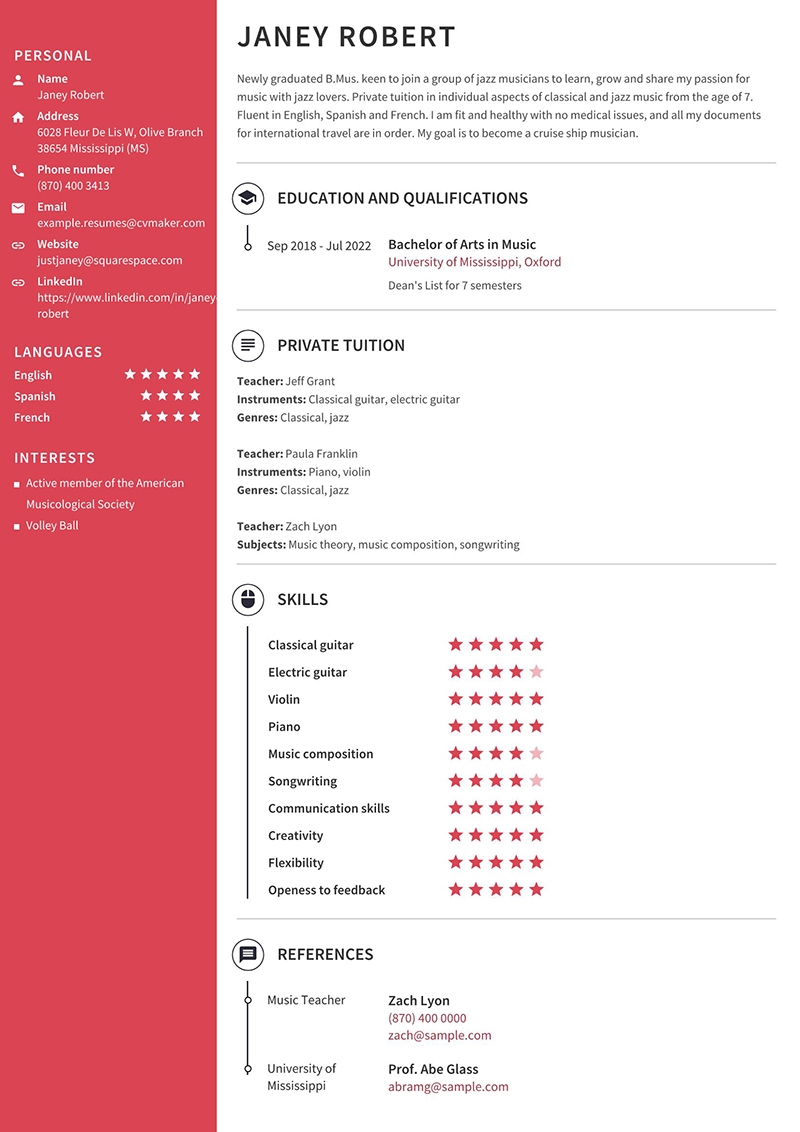
Entry-level music resumes focusing on education and skills. Janey chose our Harvard template in red.
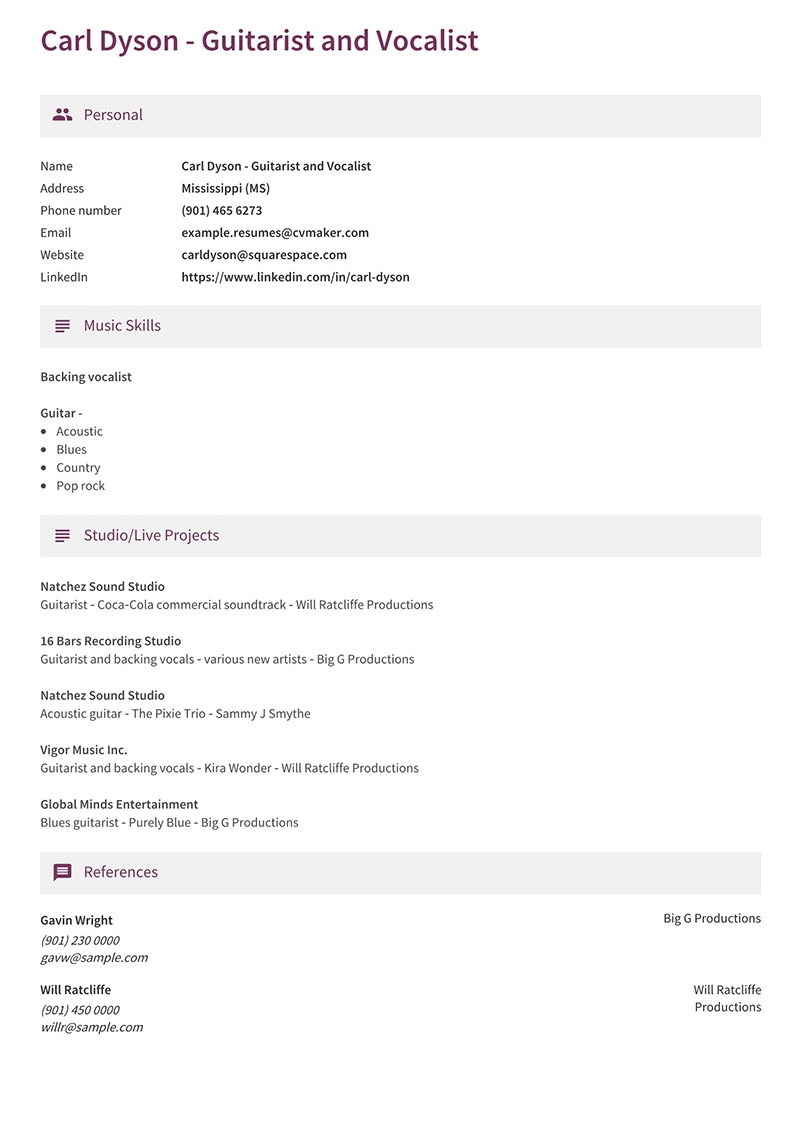
Our Berkley resume template is great for musician resume samples for gigs. Carl has opted for a touch of purple.
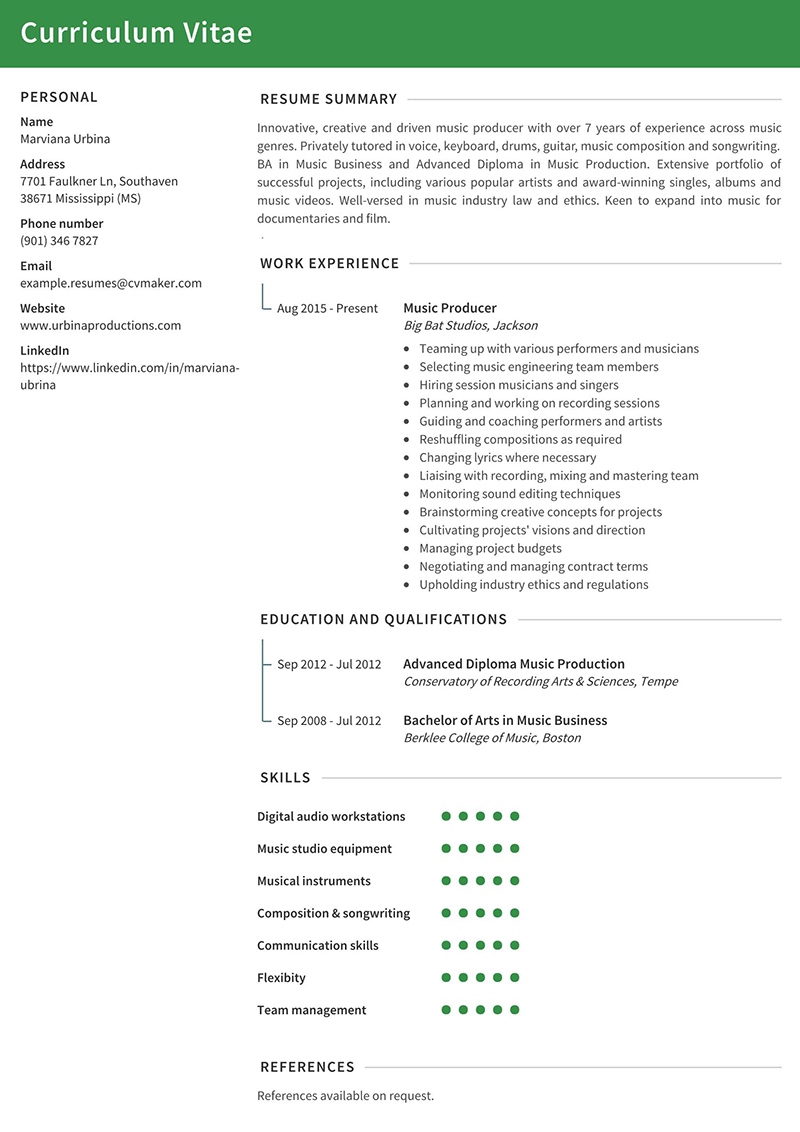
For this professional musician resume, music producer, Marviana selected our Cambridge template in green.
How to Make a Music Resume in 2024: Full Music Industry Resume Guide
So, let’s get started on how to write a music resume.
The secret to striking the right note is knowing beforehand to whom you’re pitching your talents.
It’s about understanding the potential employer, their purpose and target market, and how you can contribute to their success.
Obviously, you must have the right experience and skills to contribute, and you’ll find these in the job description.
Most resumes follow a reverse chronological order, meaning they start with your most recent music job, continuing in descending order.
While this resume format works perfectly for some music industry resumes, it can be disastrous for others. Before writing your resume for music industry, consider which sector you work in.
For example, if you’re a music teacher or engineer, you’ll likely have a more traditional job with set processes.
Usually, these music professionals are self-employed or work for an employer, so a reverse chronological music resume is perfect.
Conversely, a music performer or writer’s job is less structured and inclined to follow a creative flow process.
Many creative musicians are freelancers, marketing their work and talents to a broad range of short-term gig employers.
In this case, a reverse chronological resume format becomes confusing and irrelevant. Instead, you need a music resume that showcases successes in line with the gig on offer.
That aside, your choice of fonts, layout and content quality is equally critical to writing a winning resume for musicians.
Another aspect of recruitment today is applicant tracking systems or ATS.
Your musician CV will undoubtedly encounter ATS if you apply to bigger organizations like educational institutions or cruise ship entertainment.
Briefly, ATS are a multi-functional HR tool involved in the hiring process via parsing software that screens incoming applications.
Recruiters enter each new role into ATS with unique keywords contained in job descriptions and titles. These keywords are included in job posts.
All applications are processed through the ATS and immediately scanned for keywords. The ATS then sorts the applications according to suitability based on keyword content.
Meaning AI is the first point of selection that can see your musician resume rejected without anyone looking at it.
Therefore, crafting your music performance resume must also include beating ATS parsers to reach the recruiters’ eyes.
Finally, this must be achieved in a one to two-page maximum music resume.
While that might seem intimidating at first, it really isn’t.
We’ll tell you precisely how to make a musical resume that sings past ATS and wows hiring managers.
One more thing - a resume builder is an excellent tool that makes resume writing a breeze. You can’t go wrong with loads of music resume examples and music resume templates to choose from.
Next up - how to write your professional resume.
Personal Information
Resumes for musicians without personal details mean your job search has ended before it’s begun.
Without your phone number and Gmail, you’re uncontactable.
Where you’re applying for a full-time music job, include your residential address. If you’re successful, it will be required anyway.
However, for short-term gigs, an address isn’t necessary.
Whatever personal info you’re providing, ensure it’s accurate.
You can include a link to your online music portfolio examples and LinkedIn profile here.
If your music portfolio is vast, only include links to the kind of work being sought. No matter how amazing your work is, recruiters only want to see what they’re looking for.
Personal Information Example

Clear and easy to read - nothing more.
How to Format this Section
Accuracy, a clear business font and proper spacing are essential to make this section easy to read.
Before you share your music resume, give this section another quick run-over.
Even the most minor typo can see in your application being overlooked.
Music Resume Objective
Does a CV for musicians need a resume objective or summary?
Again, it depends on whether you’re a performing artist looking for short-term gigs or a music professional wanting long-term opportunities.
A resume objective or summary is like a short bio.
Use an objective to express your passions, intentions and goals. On the other hand, a summary outlines your music skills, experience and achievements to date.
For continuing employment in the music industry, opt for a resume summary if you have work experience. Use an objective if you’re making a music resume for college applications.
Keep your resume objective relevant to the job only for gigs. Irrespective of work experience, hiring managers only want to know if you can hit the ground running.
Does a Music Resume Need a Cover Letter?
Generally, not.
Unless you’re crafting a music resume for high school students or college applications or applying directly without an ad.
A summary or objective is an opener for a musician CV. A cover letter is formal and addressed to a specific person. It refers to the addressee by name and motivates your application.
It’s much longer in content, although it shouldn’t exceed one page. Too much content can make readers lose interest.
Cover letters give you more space to go into your musical abilities and ambitions.
Avoid sending a cover letter unless specifically requested. Furthermore, never have a generic copy for every job application.
As a rule of thumb, these are the two instances to use a cover letter –
- The job posting asks for a cover letter
- You’re applying directly and not responding to a public job post
Objective for a Resume for Musicians

This entry-level music resume objective uses education and ambitions to showcase suitability.
Performance Resume Summary for Musicians

This resume summary describes the applicant's work history, qualifications and future plans.
How to Format this Section
Like muddy audio, a pointless resume summary or objective gets passed over very quickly.
That’s not on!
Instead, entice readers to want to know more about you and your musical skills and talents.
In no more than 80 words, get creative and persuade hiring managers to give you a call.
Elevate your successes and achievements and back them up in your music industry resume.
Professional Work Experience
The experience section is where you list your work history targeted to the music job description you’re applying for.
For highly experienced musicians, it can become tricky to remember everything you’ve done previously.
Get around that mental block by compiling a master music resume.
Treat it as a living document that’s an investment in your musical career.
Take time to recall and list every job you’ve had with a complete job description, employer details and tenure dates.
Separately, list your education, courses and certifications, professional memberships and achievements.
Save your master resume and all relevant documents in a folder and update it as things change. That way, you can write a great resume at short notice.
So, what do you include in a targeted musician CV?
Everything you’d usually include, just honed down to only what’s mentioned in the job advert.
From your music resume summary to the reference section, keep content targeted to fill the employer’s needs.
Something critical to bear in mind –
Together with the skills section, the experience section is the first place ATS visit.
It’s vital to mirror the words used in the job description. Take matching details from your master music resume and edit the wording if necessary.
Don’t be tempted to include unrequested experience, even if it’s related. It’s of no value to an ATS, and you must score high on keywords to get through.
Use the same job title and keywords and list your responsibilities in the same order of importance.
While each hiring manager uses their own keywords, these are some typical ones you’ll find in music job posts -
- Communication skills
- Conductors
- Fellowships
- Interpersonal
- Instrumentalists
- Mentored
- Music composition
- Music director
- Music education
- Music history
- Music portfolio examples
- Music teachers
- Music theory
- Musical theater
- Orchestral
- Performance experience
- Principal teachers
- Symphony orchestra
- Teaching experience
Work Experience Example
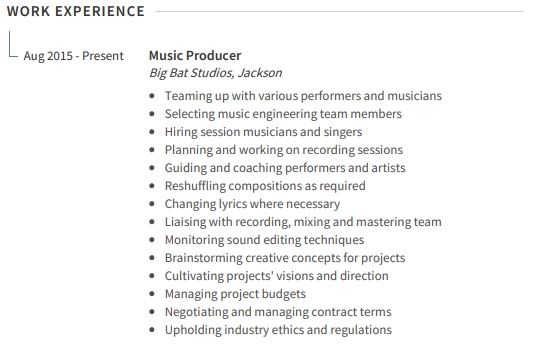
Mention only essential experience from the job post.
How to Format this Section
It’s essential the experience section is reader-friendly and easy to follow.
Use the reverse chronological resume format if you’re employed in long-term jobs. Focus more on specific performances if you do short-term gigs.
Either way, use bullet points, clear business fonts and plenty of white space to make your musical resume scannable.
Each core job role must fit into a single bullet point with one or two sub-bullet points if necessary.
Lastly, always follow the same order as the job posting.
Music Education Section
Frequently, you only need a high school education to succeed in the music industry.
Several famous musicians, from Louis Armstrong to Eric Clapton, Jimi Hendrix, David Bowie and Prince, were self-taught. Singer-songwriter Ed Sheeran has an honorary doctorate today but left school at sixteen.
However, a Bachelor of Music degree is essential to more academic music careers, such as teaching or sound engineering.
Musically gifted children often attend schools that focus on performing arts. Many also prefer to go to a private music tutor for master classes or apply to fellowships.
The education section is more important for entry-level music resumes and technical or academic music roles.
Education Example

Only include your highest level of education unless the job asks for something specific.
How to Format this Section
Keep the education section easy to read and precise.
Where you have several relevant qualifications, start with the most recent and continue in descending order
Separate formal education from short courses if you have both.
Mention the institution, qualification and dates.
Omit outdated education from years ago unless the post states it specifically.
Courses, Certifications and Tuition
Short courses, certifications, and tuition are very valuable to your music career.
Every industry evolves, and the music industry is no exception.
As you pile on years of experience, keeping your skills updated is vital to remain employable and competitive.
Private tuition can also be listed under the education section.
Courses, Certifications and Tuition Example
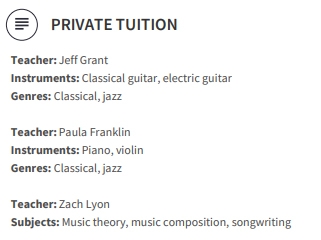
Institutions or teacher’s name and specializations are all that’s required. Dates aren’t necessary.
How to Format this Section
Treat this section the same as the education section – reader-friendly and accurate.
Always start with the most recent, working backwards.
Only include details of courses or tuition that are relevant to the job
Music Skills
Here’s where you list hard and soft skills relating to the job you’re applying for.
While you’ve likely got far more resume skills listed in your master resume, focus only on those for the role.
The skills section is another place ATS hang out looking for keywords. Give them what they want so your music resume gets moved to the shortlist.
Music jobs vary greatly, and so do the required skills.
Hard skills are learnable and teachable skills acquired through education and work experience.
Alternatively, soft skills align with personality traits we develop throughout our lives.
Musician hard skills include –
- Instrumentalists
- Music composition
- Music education
- Music history
- Music teachers
- Music theory
- Musical theater
- Orchestral experience
- Performance experience
Soft skills include –
- Active listening
- Communication skills
- Creativity
- Determination
- Flexibility
- Interpersonal skills
- Innovation
- Leadership
- Openness to feedback
- Responsibility
- Self-discipline
Skills Example
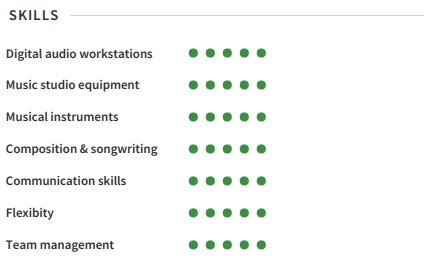
To the point with a rating for each skill.
How to Format this Section
Only list skills mentioned in the job post, no matter how many you have.
Write your musician resume skills so ATS pick them up by mirroring the words from the post exactly.
Include a rating for each skill to help the readers quickly assess your depth of experience.
References
Resumes usually close with references.
Include one or two references and confirm the referees are available beforehand, so you know their contact details are correct.
You can list references as “available on request”, too.
References Example

No frills - just accurate, up-to-date info.
How to Format this Section
When giving references, list only the referee’s name, phone number and email address.
Related Resume Templates
Maybe like many other famous musicians, you need a side hustle until you make New York big time.
You can easily find a musician resume template online that you can copy in Word, but the time, hassle and effort aren’t worth it.
Whether you’re looking for a side hustle or a musical resume template, use a resume builder to look like a pro.
Not quite ready for New York’s Broadway?
These jobs might be perfect for funding your dreams –
- Art Teacher Resume
- Bartender Resume
- Cashier Resume
- Customer Service CV
- Receptionist CV
- Waiter/Waitress CV
Final Points on Successful Musician Resume Examples
If it’s standing ovations you’re after, your music resume must do your talents justice.
Let’s recap on the essentials -
- Write a master resume to keep as a living document
- Target each job individually
- Extract keywords from each job post
- Take time selecting info from your master
- Select the correct type of music resume for the job
- Stay with a one to two-page resume
- Use professional but easy-to-read wording
- Use action verbs and positive language to keep it engaging
- Submit your resume in pdf format